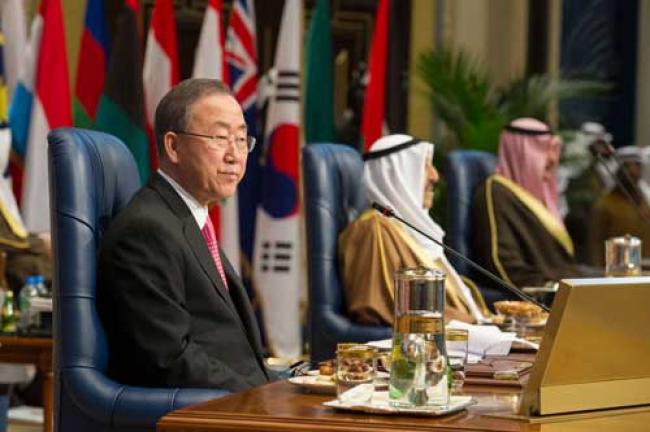Geopolitics
Aid UN seeks assistance for millions affected by Syria
16 Jan 2014, 07:57 am Print

New York, Jan 16 (JEN): Top United Nations officials at a major donors’ conference on Wednesday appealed for urgent funds to assist millions of people inside Syria and in neighbouring countries who have been affected by the conflict that has raged for nearly three years.
The conflict, which began in March 2011, has produced “unprecedented” demands for humanitarian and development agencies, UN Secretary-General Ban Ki-moon told the Second International Humanitarian Pledging Conference on Syria, held in Kuwait.
An estimated 9.3 million people in Syria, many of them stranded in hard-to-reach and besieged areas, urgently need help, according to the UN Office for the Coordination of Humanitarian Affairs (OCHA). Nearly half of them are children, who do not have adequate access to health care or education.
More than 3 million people have fled Syria and are taking refuge in Lebanon, Jordan, Turkey, Iraq and Egypt, causing great hardship and raising tensions throughout the region.
“I am asking for strong international support to meet these massive humanitarian needs,” Ban said, noting that an estimated USD 6.5 billion is needed this year.
In January 2013, the First Pledging Conference for Syria saw 43 Member States pledge USD 1.5 billion towards humanitarian efforts. Those funds were used to provide life-saving assistance for millions of people in Syria and surrounding countries, including emergency food rations, mobile medical care and vaccinations, clean water and sanitation, and basic shelter.
“Humanitarian aid is the difference between life and death, hope and despair. It has already assisted millions of people affected by this crisis,” said Ban. “I count on you to show the Syrian people that the world is here to help.”
Hosted by the Emir of Kuwait, Sheikh Sabah Al-Ahmed Al-Jaber Al-Sabah, and chaired by the UN Secretary-General, the conference offers the international community to continue supporting the humanitarian response to help the millions affected by the Syria crisis.
It comes ahead of next week’s talks in Switzerland aimed at finding a political solution to the civil war that has already claimed well over 100,000 lives amid fighting between the Government and various groups seeking the ouster of President Bashar al-Assad.
“This is the biggest humanitarian crisis we face today,” UN Under-Secretary-General for Humanitarian Affairs Valerie Amos told the conference. “We all hope that the political talks due to begin next week will deliver a positive result. In the meantime, every child, every woman, every man affected by this crisis deserves our continued support."
Amos, who recently carried out her seventh visit to Syria in nearly two years, said that “the very fabric of the society has unravelled, and sectarianism has taken hold.”
There are persistent reports of people running out of food in besieged communities, public health is in crisis and nearly one-fifth of Syria’s schools are either damaged or being used as shelters.
Despite the constraints, humanitarian operations are making a difference to millions of people’s lives every day, she noted, adding that agencies were able to increase response activities across the country throughout the past year.
“We know that we must do all we can to continue to scale up our activities this year if we are to keep pace with the growing needs,” stated Amos.
António Guterres, UN High Commissioner for Refugees, noted in his remarks that within a few years, Syria has gone from being the world’s second largest refugee-hosting country to becoming its fastest refugee-producing country.
“It breaks my heart to see the people of Syria, who for decades generously welcomed refugees from other countries in the region, now forced into exile themselves,” said Guterres.
The agency which he heads (UNHCR) has registered over 2.3 million Syrians as refugees in the region, and governments estimate the total number of those who fled at over 3 million, including many who have not asked for assistance.
Countries in the region – Lebanon, Jordan, Turkey, Iraq and Egypt – have received an unrelenting stream of fleeing Syrians and have provided them protection, at enormous cost to themselves, Guterres said.
“Few refugee influxes have ever generated this profound an impact on their host countries, with such dramatic demographic, economic and social consequences. The pressure is felt heavily in all areas of daily life, as budget deficits are increasing, growth suffers and jobs, salaries and price levels are affected across the region, leaving local families struggling to make ends meet.”
He stressed that the generosity of Syria’s neighbours needs to be matched by massive international support, and that countries in the region need not only strong financial assistance, but also need others to help carry the burden of actually taking in and protecting refugees.
“My appeal to all countries – including those beyond the region – is therefore to keep their borders open for those who are forced to flee and seek protection elsewhere,” he stated, adding that there is something “fundamentally wrong” in a world where asylum-seekers drown at sea or are pushed back from land borders.
Secretary-General Ban Ki-moon (left) at the opening of the International Humanitarian Pledging Conference for Syria in Kuwait City. UN Photo/Eskinder Debebe
More Geopolitics
- World must ‘speed up’ efforts to end AIDS pandemic by 2030
- World Bank provides $700 million to improve primary education in Bangladesh
- Aid has not reached ‘a single soul’ in Syria’s besieged areas in December, says UN advisor
- UN tribunal for former Yugoslavia leaves behind culture of accountability, says Guterres
- Security Council renews Syrian cross-border relief convoys amid ongoing challenges for aid workers






